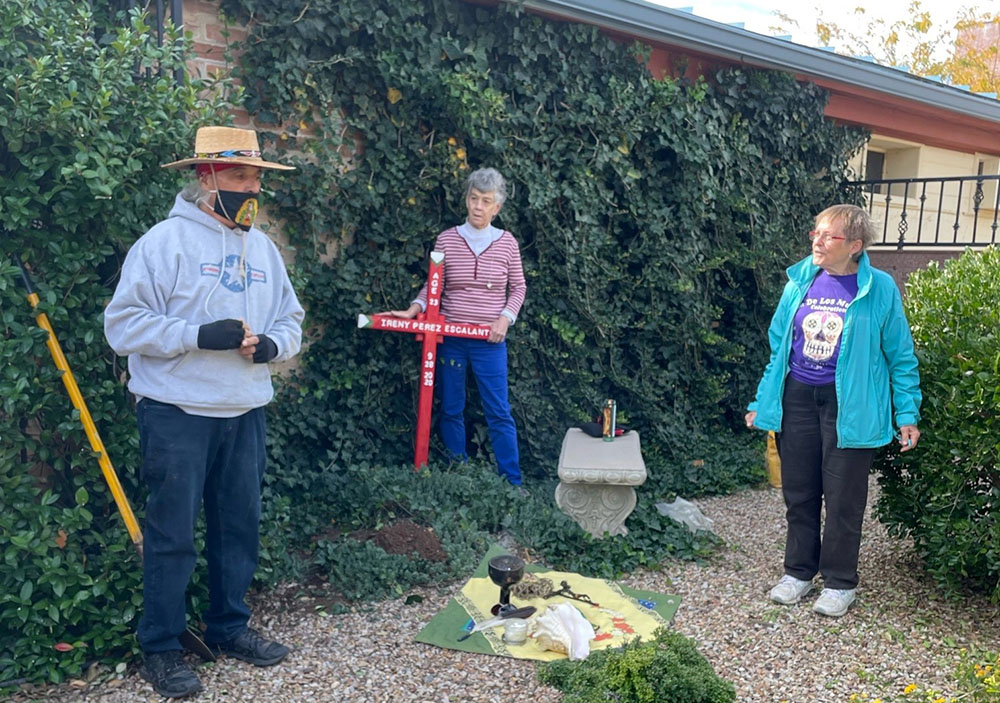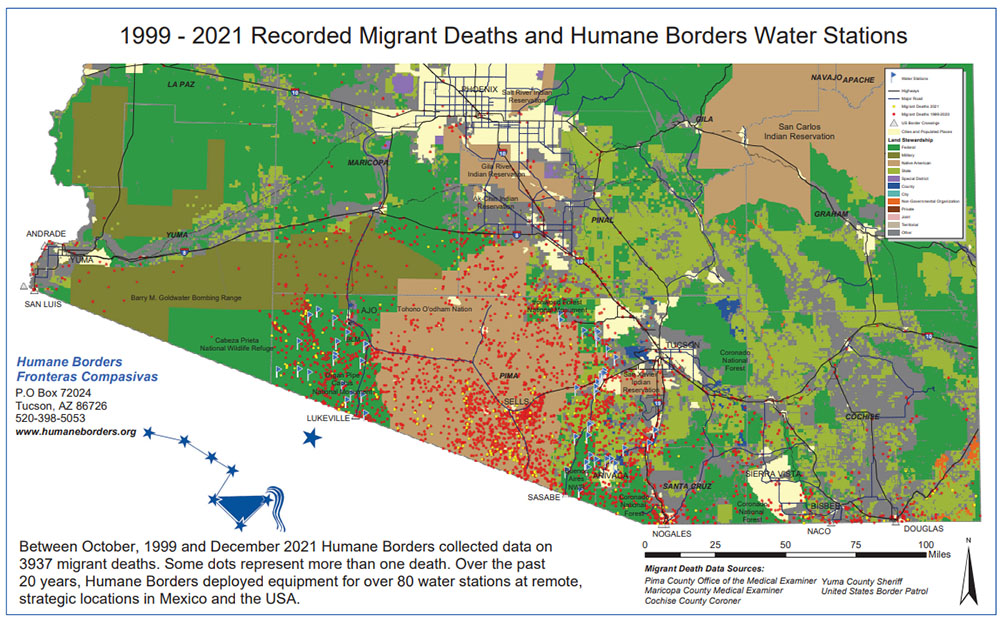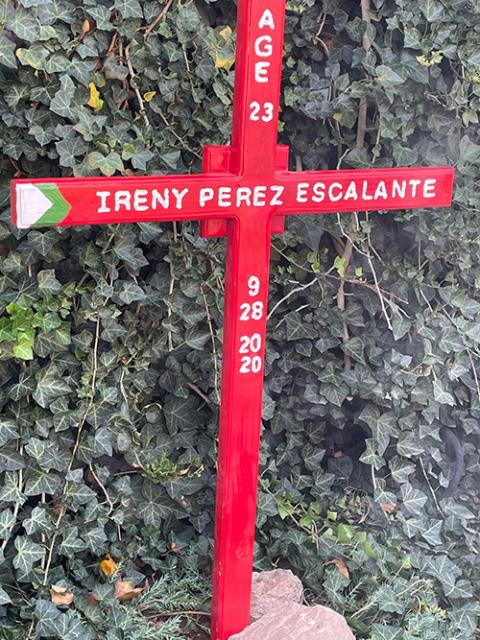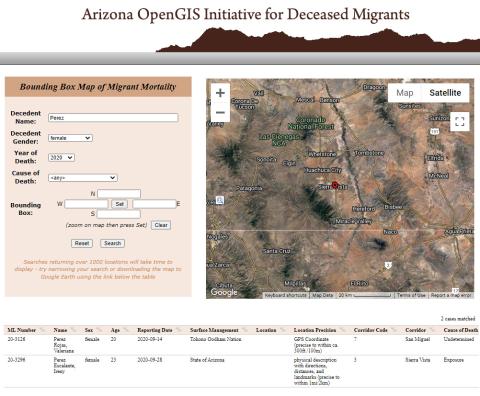
Deacon Gabriel Saspe of Douglas, Arizona, left, invites participants — including Sr. Anita Fearday, center, of the Adorers of the Blood of Christ and Sr. Lucy Nigh of the School Sisters of Notre Dame — to pray at the planting of a memorial cross for Ireny Perez Escalante in the columbaria of St. Andrew the Apostle Catholic Church in Sierra Vista, Arizona. (Peter Tran)
Her name is Ireny Perez Escalante. She was found dead here in Sierra Vista, about 20 miles north of the U.S.-Mexico border, on Sept. 28, 2020. She was 23 years old.
More than two years after her death, Deacon Gabriel Saspe, a member of the Yaqui (Yoeme), invited a small group of laypeople, priests, women and men religious from various communities, and "the spirits that are here" to join him in remembering Escalante by name on All Souls' Day at the columbaria of St. Andrew the Apostle Parish in Sierra Vista.
Sr. Lucy Nigh, a School Sister of Notre Dame who organized the planting of a memorial cross in honor of Escalante, said cross-planting services, which are usually in the desert where remains have been found, are organized to honor the memory of the migrants' lives: "their story, their desire, their dream for a better life."
"Our faith, which teaches that we are all children of God and one family, causes us to mourn this tragic loss of life," Nigh said. "We have decided that the lives of these people, unknown to us yet for the most part our neighbors to the south, should be honored and dignified. We remember and pray for their loved ones, who are surely mourning the loss and sometimes never finding out exactly what happened to them."
Nigh said more than 160 memorial crosses have been planted since 2015 in Cochise County, organized by group members from diverse backgrounds from various civic and religious groups. The School Sisters of Notre Dame also provides partial support for the ministry.

Humane Borders' map of records of migrant deaths in the Arizona desert from 1999 to 2021 (GSR screenshot)
Since 1990, the remains of more than 3,790 migrants have been found in the Arizona Sonoran Desert, according to the Pima County medical examiner's office, the Tucson-based Humane Borders and the Yuma County Sheriff's Office.
On this particular cross for Escalante, Nigh said, "We are grateful to Fr. Greg Adolf, pastor of St. Andrew the Apostle Parish, who allowed us to plant this cross," the columbaria's first.
Escalante's body was found about 4 miles away near Walmart in Sierra Vista. Nigh said, "We as a group who are strangers to her have a connection with her through our prayerful cross-planting ceremony. We have a connection with her by remembering her name."
Utilizing his Catholic and Native American traditions, Saspe invited the participants to beat drums, gongs, cymbals and wooden sticks to call on God, all the saints and all living things to be present at this memorial.
The service also included the smudging of each person — the burning of incense as a way of purifying the souls and blessings. The smoke signifies the prayers offered to God, Saspe said, adding: "We want to make sure that our prayers reach the family and that they understand that Ireny is not forgotten."
Like everyone participating in the service, I did not know Escalante; I only know about her from the Arizona OpenGIS Initiative for Deceased Migrants, a map that keeps track of the locations of migrant deaths. Humane Borders creates the map in cooperation with the Pima County medical examiner's office. In it, Escalante is identified as "ML 20-3296" with her name (Ireny Perez Escalante), age (23), the date of reporting death (2020-09-28), and the location (Sierra Vista, Arizona). The cause of death is "exposure."
When Saspe invited the participants to say a few words, many wondered why life was so fragile: She "successfully" crossed the border but succumbed to her finality. Who was she? What about her family? Where did she come from? Was she married? Did she have children? Had she been alone when she drew her last breath? Why could she not hang on to live out her dream in this land of opportunity?
What do we learn from this memorial service?
Nigh said that remembering Escalante, "who we never knew, gives witness to the fact that we are all one people. In the spirit of trying to become one world, I believe that our prayer and action, our witness, adds something."
Sr. Ellen Maroney of the Sisters, Servants of the Immaculate Heart of Mary of Scranton, Pennsylvania, was moved by the cross-planting ceremony. She said Escalante and other migrants at the border "are embedded in my heart as a constant call to work to support changes in our policies toward the migrants and refugees and to be a presence of God's love, respect and compassion to each person I encounter. That's our call — my call — to bring God's healing love to our wounded world every day."
Advertisement
Sr. Anita Fearday of the Adorers of the Blood of Christ said she learned a lesson from this ceremony.
"Sometimes, we do not always see our dreams realized in this world, as was the case of 23-year-old Ireny, a migrant whose life was cut short after crossing the U.S. border," she said.
"It was good to remember her by forming a sacred circle, calling on all of creation as we faced the four directions," Fearday said. "The sound of the percussion instruments added to the solemnity. A cross bearing her name was cemented into the earth of the parish garden of St. Andrew's Parish so she would never be forgotten."
Lasallian Christian Br. Jack Curran said he was honored to speak Escalante's name "765 days after her lifeless body was tragically found near the Walmart in Sierra Vista. We gathered to call her life to our minds and our hearts. We who knew her not in this world were mindful of and prayed for her, her family, and all who mourn her death, to do this in memory of her."

The memorial cross for Ireny Perez Escalante after its Nov. 2 planting at the columbaria of St. Andrew the Apostle Catholic Church in Sierra Vista, Arizona (Peter Tran)
In his reflection, Fr. Thaines Arulandu of the Diocese of Fargo, North Dakota, said Escalante was a migrant who traveled through obstacles, hardships, sacrifices, pain, sickness and suffering to pursue her dream. She made it through the border but fell short of that dream.
"Not knowing anything about her, we offered her soul to God in and through this nonformal but flowing ritual. It was beautiful," Arulandu said. "It was a great and meaningful eyewitness for me to express my love and respect to the unknown and fallen soul as the image of God, which we all share."
He added: "In sharing God's image, we all are made one and equal. In God's terms, we are all one and the same. God counted poor Lazarus as high against the successful rich man. God merited the poor widow's gift in contrast to the rich and the wealthy."
Nigh said dying in the desert "is a tragedy born of desperation. Visas to cross legally are costly and nearly impossible for most who seek to come to the U.S. to work or unite with other family members, so they cross between ports of entry. Our border policies tried to discourage an illegal crossing, but all the measures to make that crossing more difficult have not been a match for the desperation and risk that mothers, fathers and children have made in trying to achieve the American dream."
After reflection, I know now the reason why I need to remember Escalante, a stranger to me. Loving our neighbors must be expressed concretely.
I was reminded by Chiara Lubich, founder of the Focolare Movement, in her book The Art of Loving. She wrote: "We must be one with our neighbor not in some ideal way, but concretely, here and now and not just in some distant future. Becoming one means feeling ourselves how the other feels. ... Become the other. We do this out of love for ... Jesus in our brother or sister."






